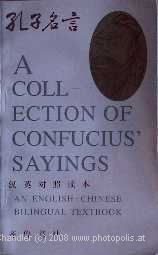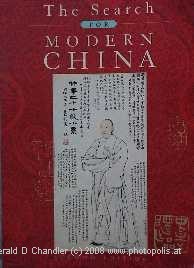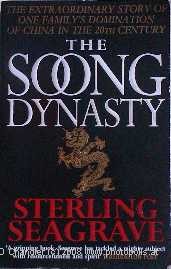Home | Front Page | Blog | Index | New | Contact | Site Map
2002
Fiction
History
Guides - Med
Guides- Euro
|
|
The
Collision of Two Civilizations
The Embassy to China in 1793 of Lord George Macartney. by Alain Peyrefitte A wonderfully written and translated account of the unsuccessful attempt by Lord George Macartney, on behalf of George III, to persuade Qianlong, the 3rd Qing emperor, to open up China more to British trade. A very clear-eyed view of the foibles of both sides as well as a brief account of the consequences of the embassy's failure. Highly recommended. Jan was especially impressed by Jon Rothschild's translation from the French original.
|
 |
A Collection
of
Confucius' Sayings
An English-Chinese Bilingual Textbook.
A mildly interesting collection
of sayings.
It is published by a Chinese company and the English is not
very good.
See
The Life of Confuius
below.
|
|
|
East
and West
by Chris Patten, former Governor of Hong Kong. An interesting after-the-fact justification of Patten's failed attempt to introduce democracy to Hong Kong against the vigorous opposition of the Chinese government. Like us, he obviously did a lot of learning "on the job". Most interesting are his comments about dealing with the Chinese government. The very unrepresentative sample of people that I have talked to about Patten splits clearly along ethnic lines: the Chinese didn't like what he did, the Brits did. This is seemingly because the Beijing government didn't like more democracy and the local Chinese "stood with their government." Patten seems to have created a career as negotiator for impossible tasks. Most recently he has headed the "Patten Commission" in Northern Ireland. We found this book on the shelf of our landlords the Tillbrooks in Hong Kong and immediately dug into it.
|
|
|
God's
Chinese Son
The Taiping Heavenly Kingdom of Hong Xiuquan by Jonathan Spence A much less weighty book than the history of Modern China, also by Spence, the story of the Taiping Heavenly Kingdom (1850-1860) and its leader Hong Xiuquan is worthy of a Hollywood epic. It is also sad and depressing for the amount of blood shed on both sides and the lack of concern either leader had for the day-to-day well-being of their subjects. In our travels, particularly in Nanjing in 1999 & 2000 we saw several Taiping sites related to the government Hong Xiuquan set up. In February, 2001 we travelled to his home town, way out in the c ountryside of Guangxi, and saw a movie set there used for filming part of his life..
|
|
|
The
Last Emperors
by Harrison Salisbury This biography of Mao Zedong and Deng Xiaoping is a terrifically written short history of the Communist State. The first two thirds are about Mao. The ways he manipulates people are chillingly told. Highly recommended. It is partially based on travels of several thousand miles made by Salisbury, formerly a columnist for the New York Times, into what was then newly opened China.
|
 |
The
Life of Confucius
A detailed account of the life of the 4th century BC philosopher known to the Chinese as Kong Fu. He lived in the lower Yellow River plain, the heartland of where Chinese culture first developed. Centuries later it conquered and spread as far south as today's Vietnam, but in Kong Fu's day the region consisted of a lot of petty kingdoms. Today his hometown has created a tourist industry around him; we found the temples and Kong family compound rather interesting. His grave is supposedly in the town, but it wasn't identified as such until 1000 years after his death. Kong Fu wandered from palace to palace in search of a patron worthy of him, but never found one to his liking. Like Buddha and Christ, he might be unheard of today except for his disciples. The greatest of them, Mencius, put his words into writing and laid the foundation for Confucianism. In fact, the "religion" did not take off until nearly a thousand years later when political expediency of the then emperor led him to adopt and spread it.
|
 |
The
Search for Modern China
by Jonathan D. Spence We bought this book in Hong Kong at the end of our first 3-month stint in China. We were anxious to find a third-party history of China having found all references in China itself even to pre-Communist history to be heavily skewed by Communist propaganda. A very nicely written account of the history of China from 1600 to the present day, it was written by a university professor as a text book; it is much better than the usual text. Nonetheless, based on other history, such as Salisbury's there seem to be flaws in the treatment of the 20th century.
|
 |
The
Soong Dynasty
by Sterling Seagrave
"The extraordinary story of one family's domination of China in the
20th Century." This jacket blurb pretty much sums up the exaggerations
and distortions of this book.
According to it every thing that happened - mostly bad - was due to these three sisters and their father and brother.
One sister married Sun Yat Sen and became a pawn of Mao Zedong.
Another married Chiang Kai-shek and became his roving ambassador to America.
For an even more biased book by a communist sycophant see
Woman in World History.
|
|
|
Wild
Swans - Three Daughters of China
by Chang Jung A wonderful first person account of the author's life during the Cultural Revolution combined with biographies of her mother's life as an official in Communist China and of her grandmother's life as a concubine in Imperial China, a wife and mother under the Guomindang (Chiang Kai-shek), a mother and grandmother under the Communists. This book covers almost the same period as the Soong Chingling biography, " Woman in World History.", but gives a very different and much more riveting picture of China in the 20th century. 650 wonderfully-written, action-packed pages. A must read.
|
|
|
Woman
in World History
Soong Chingling (Mme Sun Yatsen) by Israel Epstein Mostly a propaganda tract for the Communist Party but provides a basic outline of 20th century Chinese history of which I had been largely ignorant. Interesting as a counterpoint to Wild Swans. Sun Yatsen is revered as the first President of Republican China and his second wife, Soong Chingling had two sisters. One married Chiang Kai-shek, the successor to Sun Yatsen, the other his finance minister H.H. Tung, both of whom became sworn enemies of the Communist regime. Soong Chingling became an ambassador and apologist for the Communists. Epstein himself lived many years in China; he was caught up in the Cultural Revolution and jailed; even with that he could hardly bring himself to criticize Mao.
|